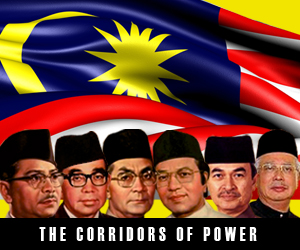Dr Mahathir needs to feel he is still important and still relevant
So there you have it, from Dr Mahathir’s own mouth. He needs to be consulted. He needs to feel the party still needs him. He needs to still feel important and relevant. And when his successors demonstrate that they are very capable of running the country on their own without any help or advice from their predecessor, then Dr Mahathir would move in and bring them down.
THE CORRIDORS OF POWER
Raja Petra Kamarudin
One keeps wondering why Tun Dr Mahathir Mohamad needs to keep interfering in how the country is run. There are many ex-Prime Ministers and ex-Presidents all over the world but Dr Mahathir appears to be the only one who feels he is still in charge and can tell the sitting Prime Minister what should be done and how.
In fact, one reason why Dr Mahathir was very angry with Tun Abdullah Ahmad Badawi (Pak Lah) was because he spent 15 months prior to 1st November 2003 in numerous meetings to tell Pak Lah what he must do, what he can and cannot do, and how he should run the country once he takes over.
There were very strict ground rules that Pak Lah had to observe. There were certain things he should not disturb or interfere with. There were certain things that Dr Mahathir started which Pak Lah needs to continue with and see to the end. There were certain taboos that Pak Lah should not break.
In short, while God gave Moses just Ten Commandments, Dr Mahathir gave Pak Lah 100 Commandments. And Pak Lah is not to break even a single one of them. But then what did Pak Lah do as soon as he took over? He did everything that he was told he should not do and did not do anything that he was told he must do.
And that was why Dr Mahathir wanted Pak Lah out. Pak Lah may have been the Prime Minister. But then Dr Mahathir is still in charge and Pak Lah must run the country the way he has been told and not the way he wants. And the same applies to Prime Minister Najib Tun Razak as well.
Chris Wright of the South China Morning Post (SCMP) probably explained it well in his June 2015 article — Why Mahathir Mohamad can’t keep out of Malaysian politics.
“The man who for 22 years shaped the modern Malaysian state tells Chris Wright about his disillusionment with his successors, why he feels he has to intervene, and the perils of a free press,” was the sub-heading of that article, which is very telling indeed to say the least.
I have taken some extracts of the article, which are in red-italics below, but if you wish you can read the full article here: http://www.scmp.com/magazines/post-magazine/article/1823145/why-mahathir-mohamad-cant-keep-out-malaysian-politics
What would happen the day after he relinquished two decades of absolute power? And the next day, and the next?
“It was very unsettling, I would say,” says Mahathir, with a sad smile. “Because you move away from a position of power to being just an ordinary person. I thought I would … relax, write my memoirs, things like that.”
He pauses. “It was a little bit depressing.”
“I thought the party [United Malays National Organisation] might use me, ask for my views,” he says, with what seems like genuine sadness. “But it turned out that the party doesn’t want to have anything to do with me.”
He seems to have forgotten his commitment, when still in office, to stay out of politics in retirement. What of his pre-departure pledge that “when I leave, I leave completely”?
Well, I was practically forced to [return],” he says. “Because I didn’t expect such bad treatment by the new prime minister, who basically I elevated to that position.”
“I don’t hold any grudge against people,” he says, the first of several comments in the interview that appear unlikely in the extreme: Mahathir’s ability to remember a slight for years and even decades is legendary. But it’s clear that Mahathir feels he was owed something by Abdullah for having brought his successor to power, despite earlier opposition. “I thought he would be, not grateful to me, but at least not vicious to me. And he was.”
“Within two weeks he changed everything. Rejected all the things I had started, which he promised to deliver.”
In 2009, Mahathir helped to bring down his successor, and was delighted to see another of his apparent protégés take the reins. Najib Razak remains prime minister. Now, though, Mahathir doesn’t like him much either.
“Well, I had great hopes for him,” he says. “I felt my relationship with him would be very close and at least I would have the opportunity to give some views to him. Unfortunately, for the first six months, he totally ignored me.”
Najib failed to reinstate the Mahathir-planned megaprojects that Abdullah had mothballed, notably a bridge to Singapore.
“I began to have doubts about his performance. I tried to tolerate, I tried to support him during the election, I campaigned for him. But eventually I had to tell him I am not supporting him any more.”
So there you have it, from Dr Mahathir’s own mouth. He needs to be consulted. He needs to feel the party still needs him. He needs to still feel important and relevant. And when his successors demonstrate that they are very capable of running the country on their own without any help or advice from their predecessor, then Dr Mahathir would move in and bring them down.


